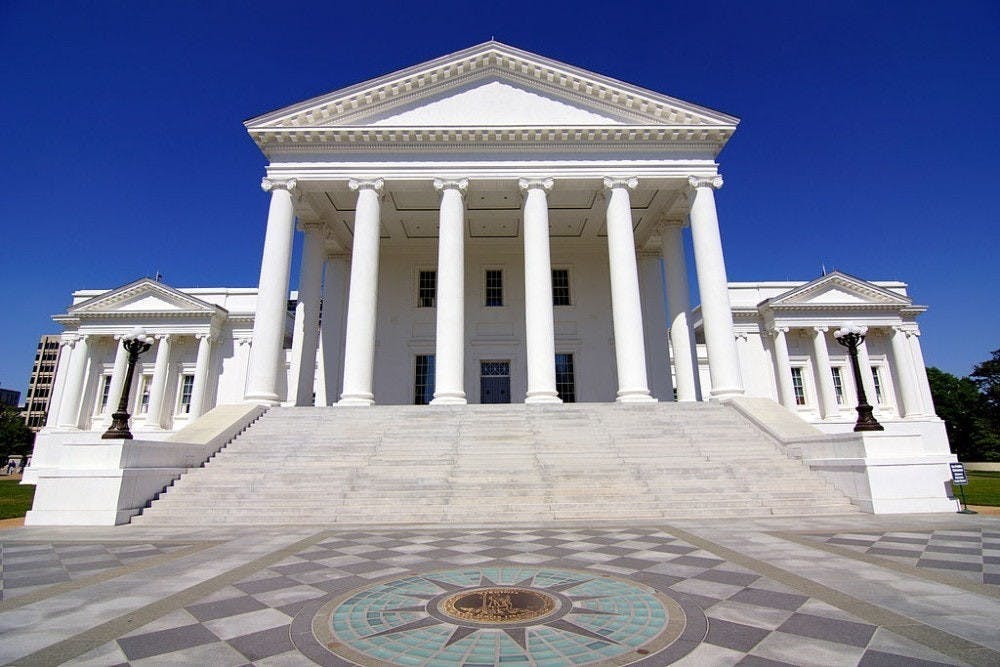The Virginia General Assembly wrapped up its legislative session March 1, with some of the proposed bills and budget amendments allocating more money to public higher education institutions and expanding voting access. Student Council’s Legislative Affairs Committee lobbied for several of the initiatives that were passed. Governor Ralph Northam has until March 31 to propose new amendments, so the budget’s impact on tuition for the next two fiscal years is uncertain.
Out of the three initiatives the Student Council’s Legislative Affairs Committee lobbied for The General Assembly to pass to expand voting access, two were adopted. Student Council also called for the state to increase funding for the University, which was also approved by the Virginia House and Senate.
The General Assembly passed SB 1097, which will no longer require witness signatures for absentee voter ballots in Virginia “during [a] declared state of emergency related to a communicable disease of public health threat.” The bill also directs the Department of Elections to find an alternative to witness signatures for verifying ballots’ legitimacy. Student Council lobbied for this bill in order to expand voting access.
A Virginia court previously ruled that witness signatures were not required on absentee ballots for the Nov. 3, 2020 general election, and over 2.6 million Virginians cast absentee ballots in the 2020 general election, compared to just 566,948 in 2016.
Student Council also called for the General Assembly to pass the constitutional amendment SJ 272, which would restore convicted felons of the right to vote following their release from prison. Currently, approximately 366,000 individuals in Virginia are ineligible to vote due to a felony conviction.
If signed into law, SJ 272 would also allow those previously deemed “mentally incompetent” to vote. Virginia’s constitution currently states that “[n]o person who has been convicted of a felony shall be qualified to vote unless his civil rights have been restored by the Governor or other appropriate authority.”
The General Assembly also passed SB 1331, which aims to reduce voting barriers for those who are visually impaired or have a print disability. If signed into law, voters will have access to vote with electronic ballots enabled with screen reader assistive technology.
“On receipt of an application for an absentee ballot from an applicant who indicates that he will require assistance due to a visual impairment or print disability, the general registrar is required to offer to provide to the applicant the ballot marking tool with screen reader assistive technology,” the bill said.
In an email statement to The Cavalier Daily, Hannah Koizumi, chair of Student Council’s Legislative Affairs Committee, said that Student Council called state legislators to support two bills to increase state funding for the University, both of which were passed.
The Higher Education Unified Amendment will allocate $60 million in fiscal year 2021 and $73.5 million in FY 2022 to Virginia’s public universities “for operational support to enhance financial aid, or to address the impacts of the COVID-19 pandemic.” Under this amendment, the University will be allocated $3 million to maintain affordable access in both FY 2021 and FY 2022.
Of the $60 million to be allocated in FY 2021, $34,524,000 comes from federal funding and will help cover the costs of COVID-19 testing at universities. Any unused funds will be carried over to the next year.
Out of the funds allocated to the University through the Higher Education Unified Amendment in FY 2021, $2.25 million will go towards covering COVID-19 testing costs. In the latter six months of 2020, the University’s academic division spent $55,472,590 on its COVID-19 response, which included the costs of testing, isolation and quarantine housing, personal protective equipment and technology. The University received $31,349,462 in federal funding to cover those costs but the funding for the remaining $24,123,128 has yet to be identified.
$40 million of the amendment’s appropriated funds for FY 2022 will “address affordability issues” that are “due to unavoidable cost increases and required spending” at universities, of which $3.5 million will go to the University.
The proposed amended budget will also allocate $2.5 million in additional funds for cancer research at the University.
Northam’s proposed budget for FY 2021-22 will provide over $1.7 billion to the University, more than a $100 million increase from the previous two fiscal years and will go into effect July 1.
Student Council also called on the General Assembly to “intervene and eliminate the exemption allowing faith-based organizations to discriminate based on sexual orientation and gender identity” after a leader of the Chi Alpha Christian Fellowship was told to step down for disclosing that he had a boyfriend. The General Assembly did not pursue this initiative this session.
Koizumi said that Student Council is speaking to representatives about repealing State Code 23.1-400, which prohibits the state from discriminating against a religious or political student organization that is exercising its rights to order the organization’s internal affairs, select the organization’s leaders and members or define the organization’s doctrines. State law does not permit discrimination based on political or religious affiliation for members of organizations.
Additionally, Student Council lobbied for the General Assembly to pass a bill ending unpaid prison labor, as the University has purchased face masks during the pandemic and furniture produced by unpaid inmates.
Additionally, Student Council lobbied for the General Assembly to pass a bill ending unpaid prison labor, as the University has purchased face masks during the pandemic and furniture produced by unpaid inmates.
The General Assembly also did not introduce a bill to end this practice this session either. Koizumi said that this year’s session was shorter than previous years and offices were only able to introduce seven pieces of legislation, so there was less opportunity to do so.
The House of Delegates also passed a bill that would require public colleges and universities to provide free tuition to descendants of enslaved laborers who built and maintained those institutions. The bill will be considered by the Senate of Virginia during special session.





